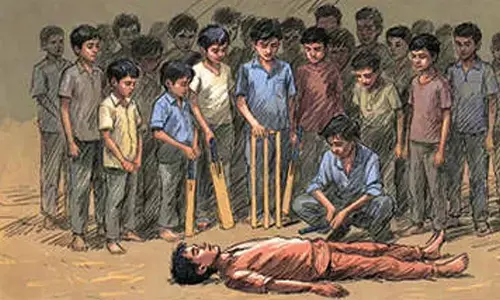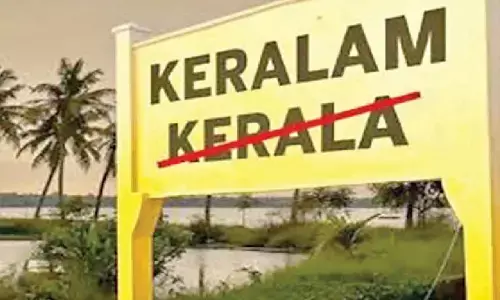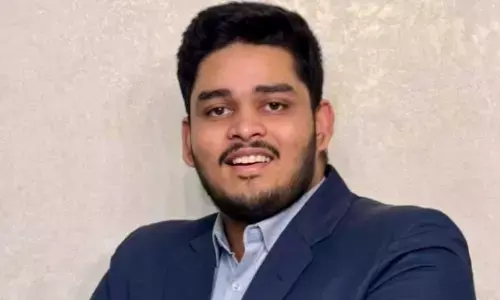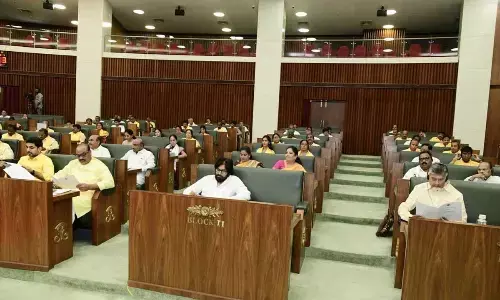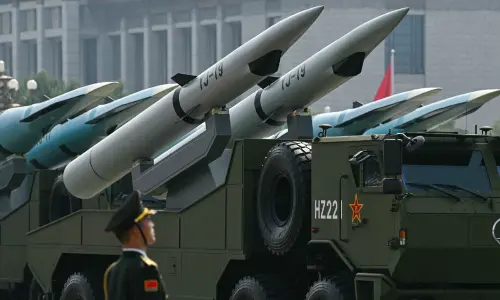Mar 11 matters a lot for Modi
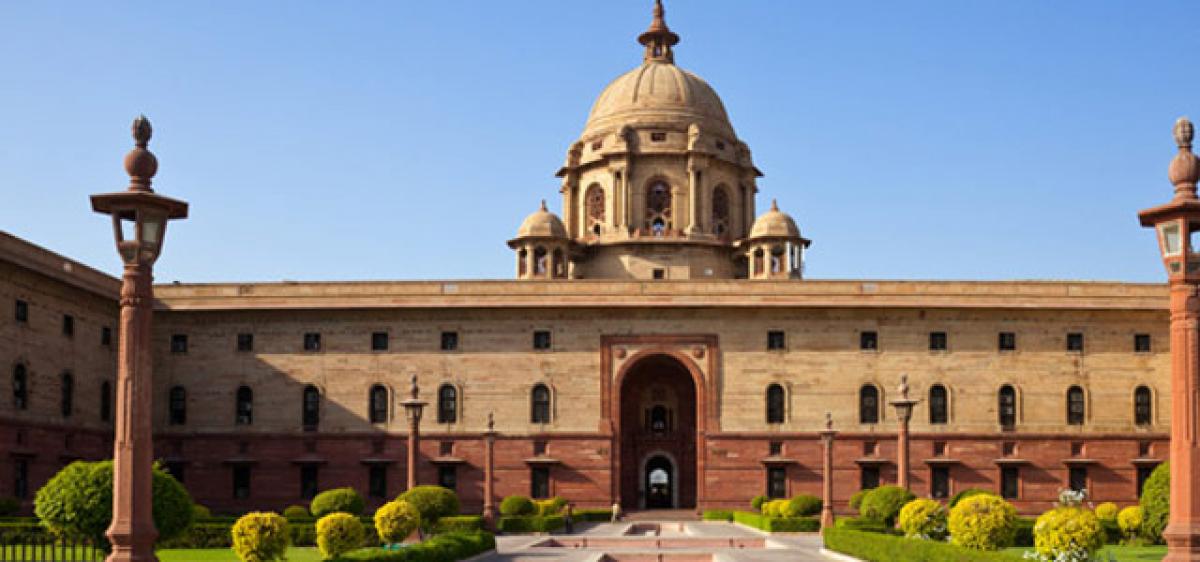
The outcome of this year’s state assembly polls that will be known on Saturday will trigger the next round of political battle, that of electing the President and the Vice-President in July and August respectively.
The outcome of this year’s state assembly polls that will be known on Saturday will trigger the next round of political battle, that of electing the President and the Vice-President in July and August respectively.
Whatever the results, and the extent of success or otherwise of the Bharatiya Janata Party (BJP), it would be safe to say the choice for the two constitutional offices will rest with the party, more specifically, with the Prime Minister. For, whatever else the Indian democracy is, when it comes to choosing the President, it is a “Prime Minister-o-cracy.” This has always been the case and it is unlikely to change.
Another safe guess, although not governed by any rule or the Constitution, is that the present incumbents, President Pranab Kumar Mukherjee and Vice President Mohammed Hameed Ansari, will demit offices on completion of their terms. Neither of them is likely to be repeated. For Ansari, it would be two five-year terms in office.
Past presidential elections have been preceded by much speculation and this time it will be not be different. This is so because the BJP does not enjoy overall majority in the Electoral College and is short of numbers in the Rajya Sabha. This will alter depending upon its successes in the assembly polls, especially in Uttar Pradesh having the largest electoral college.
For record, no President has got a second term except the first, Dr Rajendra Prasad. He was a political equal of Prime Minister Jawaharlal Nehru, a fellow freedom fighter and had presided over the Constituent Assembly. Indeed, Nehru’s attempt to elevate the then Vice President Dr Sarvapelli Radhakrishnan, at the end of Prasad’s first term was scoffed at by the party seniors.
From then on, each President has served only one term. Some, but not all, Vice-Presidents got elevated to the presidency. Among those who did not were Justice M Hidayatullah, B D Jatti and Krishan Kant. Ansari will join that group.
There is little scope for speculation – that will persist, anyway –regarding Mukherjee and Ansari. For one, they were elected during the Congress era and as stressed earlier, their successors will be those Prime Minister Narendra Modi would want.
Other issues of speculation and animated coffee house debate, like the time-and-again demand of allowing more powers to the President vis-a- vis the Prime Minister are useless political exercises. It is a given. The Indian Constitution clearly envisages an all-powerful Prime Minister and his/her cabinet and a President who is generally titular and ceremonial, playing a crucial role only in the formation of a new government.
To that, one may add in troubled times that befall us from time to time, he/she is also the conscience-keeper of the nation – but one who can act only within the ambit of the Constitution.
Whatever their functions and powers, the offices of the President and the Vice-President are political in essence. This makes it essential that they are in tune with the thinking and actions of the elected government of the day. This does not always happen and even if the institutions do not clash, those occupying them can differ on issues. This happened time and again in the recent years.
Much has been written, long after they were gone, about Prasad’s and later Radhakrishnan’s unease at the constitutional arrangement, but the basics have not changed.Both Mukherjee and Ansari have been critical, albeit well within the ambit of public and political correctness, of the spirit and intent behind some of the omissions and commissions by the Modi government and/or the impact they have caused. Both have emphasised on the need for rule of law to prevail at all times and on the wisdom of the government carrying all sections of the people along.
Both have sought to hold the mirror to the ruling leadership, stressing the need for an inclusive approach in times of protests by many sections of the society over perceived acts of intolerance by members of the government, the ruling party and their numerous front organisations.
Ansari’s emphasis on treatment of religious minorities earned him much trolling in the social media – mainly because he belongs to one of them. Mukherjee has on at least a dozen occasions talked of inclusiveness in the government’s dealing with the people and issues. The latest was his call for allowing autonomy to the universities and institutions of higher learning and keep them free for debate.
In impliedly referring to the recent developments on the Delhi University campus, Mukherjee seemed to be recalling what had earlier happened on the campus of the Jawaharlal Nehru University (JNU) and in Hyderabad.
It is obvious that the cautions and implied criticism by the two could not have gone well with the political leadership in the government. But niceties are maintained, as they should be. The time for the political leadership to act is now, when the two offices will fall vacant.
One is reminded of a similar situation that ensued in the wake of the 2002 violence in Gujarat. Late K R Narayanan, again a choice of the previous government, made known his concerns at the Vajpayee government’s perceived failure to play a role that would stem the violence and correct the aberrations in the state.
Indeed, Narayanan would receive delegations from Gujarat complaining of being victims of violence and women among them would be met and consoled by Usha Narayanan. In such a situation, it would be futile to expect, as some critics of that government did, Prime Minister Vajpayee and the BJP even to consider facilitating Narayanan’s re-election.
Earlier, late Giani Zail Singh as the President had serious misgivings about the storming of the Golden Temple in Amritsar in 1984. A Sikh himself, he suffered in silence at the bloodshed, first in the shrine and later, when Indira Gandhi was assassinated and in its aftermath, several innocent members of his community were killed.
His unhappiness at the way he felt he was being treated by Rajiv Gandhi has been the stuff of much political speculation and writings. Those were turbulent times, but in fairness to all, it must be said, neither side crossed the Rubicon and acted in a manner that would jeopardise the President-Prime Minister relationship as laid in the statute book.
Mukherjee and Ansari can be expected to write their memoirs and much else. Scholarly Ansari has long years of having engaged in diplomacy to record for posterity. Mukherjee, with four decades’ experience in government, perhaps longer than anyone else today and covering most key government portfolios at the federal level, has made known his intention to write the concluding part of his memoirs about his years in Rashtrapati Bhavan.
They would be doing well in recording much-needed contemporary history the way some of their peers, including APJ Abdul Kalam and Hidayatullah did. Whether they would get paid the way the Clintons ($ 15 million) and the Obamas ($ 80 million) are in the United States is a different matter. But for sure, they will not launch a political party or turn TV anchors like Pakistan’s General (retd.) Pervez Musharraf!
On the contrary, after the ‘opulence and grandeur’ of Rashtrapati Bhavan will come austerity. Entitled to a house, Mukherjee is expected to return to his relatively modest government bungalow at New Delhi’s busy Talkatora Road that he had occupied as Union Minister for long years.
India has done better than Britain, the United States among others who swear by democracy in electing a woman, members of religious minorities, a philosopher, a scientist, those from different regions and language groups. They were people who excelled in their areas of activities before they ascended to the two high offices. The incoming persons later this year will hopefully continue with this record.


